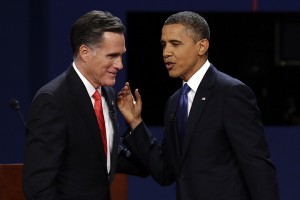

Associated Press
By Linda Wilkins
Assistant City Editor
Dr. Dave Bridge has taught at Baylor for three years as an assistant professor in the political science department. In 2010, he graduated from the University of Southern California with a doctorate in politics and international relations. Currently, he teaches American politics and a class that focuses on campaigns and elections. Bridge gives his opinion of the state of the presidential race in the second installment of the Lariat’s election Q-and-A series.
Q: In each of the four debates — the three presidential debates and the vice-presidential debate — the candidates provided much information concerning their standpoint and each other’s standpoint on numerous topics. How should voters approach the information provided by the debates?
A: Most voters’ minds are already made up. The debates are primarily targeted at undecided voters and, more specifically, undecided voters in swing states such as Iowa, Nevada and Ohio. It depends on individual voters’ preferences as well. Some are looking at the candidates’ policies, some are interested in charisma, and some are looking at whether the candidate looks and sounds presidential. Voters should decide what they are looking for and decide for themselves who they feel is best suited.
Q: What do the polls indicate about who won each debate?
A: The polls showed a clear victory for Romney in the first debate. In the second debate, Obama might have done better than Romney, but his advance in the polls was not as much as Romney in the first debate. He may have gained only a slight advantage. For the vice-presidential debate and the third presidential debate, the polls showed that these debates were more of a draw.
Q: Undecided voters currently represent 2 percent of voters, according to a Rasmussen Report poll. Since the debates are targeted toward undecided voters, what are the implications of the polls concerning the possible outcome of the election in terms of undecided voters?
A: It is difficult to know how undecided voters were affected. There is such a small number of undecided voters, and it is difficult to specifically target undecided voters. What really matters is the location of the undecided voters. Swing voters in Ohio, Virginia or Iowa are more important to provide a victory for a candidate than undecided voters in Texas or New York.
Q: Colorado, Florida, Iowa, Michigan, Nevada, New Hampshire, North Carolina, Ohio, Pennsylvania, Virginia and Wisconsin are considered swing states. The debates are meant to target voters in swing states, but what is the importance of swing states such as these?
A: In a winner-take-all system, it’s about winning individual states. We already know Texas is going red, and New York is going blue. However, we don’t know how Ohio is going to vote. Those states that are still up in the air are the states the candidates are focusing on. The electoral college could end in a tie based on what the polls are showing and based on how the states swing. The polls show some states have swung a little more towards Romney, so a tie, while unlikely, is still possible.
Q: The debates are meant to provide voters with information regarding each candidate. How would you summarize the candidates’ main indictment of the opposing candidate?
A: The distinction is clearer when it comes to domestic policy, which was seen in the first debate and quite a bit in the second debate. In the final presidential debate, there were more points they agreed on than in the first. The main concern of the average citizen is the state of jobs in the economy. The first debate offered voters two clear options.
Q: Have the debates provided clear positions of the candidates?
A: Their positions are not necessarily clear, but they are more publicized. People have more of an idea about what Romney is campaigning on and what Obama is campaigning on.





